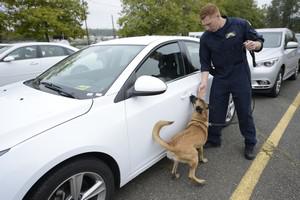Explosive detectionImproving canine detection of explosives
The Department of Homeland Security (DHS) Science and Technology Directorate (S&T) has awarded $564,988 in funding to Auburn University for two research and development (R&D) projects designed to improve the effectiveness and efficiency of canines trained to detect explosives.

"Bomb-sniffing" canine at training // Source: coastguard.dodlive.mil
The Department of Homeland Security (DHS) Science and Technology Directorate (S&T) has awarded $564,988 in funding to Auburn University for two research and development (R&D) projects designed to improve the effectiveness and efficiency of canines trained to detect explosives. “Canines are the best, most versatile, mobile explosives detection tool we have supporting Homeland Security,” said Don Roberts, S&T Detection Canine Program Manager. “S&T is making important investments in research to define the strengths and limits of detection canines. What we fund provides the community with the tools, techniques, and knowledge to better understand, train, and use explosives detection canines and enables more effective and efficient operational performance.”
S&T says that Auburn University has received two funded LRBAA awards:
· The Whole Spectrum Explosive Odor Training Project received $280,566 to develop a scientifically validated canine training program enabling canine teams to overcome adversaries’ attempts to modify, filter, or reduce explosive odor signatures in improvised explosive devices (IEDs). S&T will also be conducting research to expand the understanding of how threat concealment affects a canine’s ability to detect odor, and explore development of training aids that specifically mimic such conditions.
· The Examination and Enhancement of Canine Evaluations Project received $284,422.00 to examine the practical difference in performance measurement data integrity between single- and double-blind canine team evaluation methods, and will use the resulting data to develop tactics, techniques, and procedures to improve detection canine team performance.
Two contracts were awarded under Long-Range Broad Agency Announcement DHSST-LRBAA-14-02 EXD.08, Canine Explosive Detection Technologies topic area, which addressed several areas of detection canine R&D.
